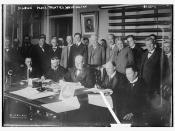1. Speaker- person who is presenting an oral message to listener.
Message- Whatever speaker communicates to other Channel- The means by which a message is communicated.
Listener- Person who receives the speakers message Feedback- The message, usually nonverbal sent from listener to speaker.
Interference-Anything that impedes the communication Situation- The time and place in which speech communication occurs. (Lucas 16-19) 2. The three types of plagiarism are Global, patchwork and increment. (Lucas 43-45) 3. The four types of listening are: Appreciative Listening: listening for pleasure or enjoyment, as when we listen to music, to a comedy routine, or to an entertaining speech.
Empathic Listening: listening to provide emotional support for the speaker, as when a psychiatrist listens to a patient or when we lend a sympathetic ear to a friend in distress.
Comprehensive Listening: listening to understand the message of a speaker, as when we attend a classroom lecture or listen to directions for finding a friends house.
Critical Listening: listening to evaluate a message for a purpose of accepting or rejecting it, as when we listen to the sales pitch of a closing argument of an attorney in a jury trial. (Lucas 57).
4. Personal Inventory: inventory of you experiences, interests, hobbies.
Reference search: Search libraries for encyclopedia Search World Wide Web, Yahoo and googol for information. ( Lucas 77-78) 5. A person who is egocentric is someone who plays close attention to messages that affect their own values, belief's, or well being. To me as a speaker these implications mean my listeners will hear and judge what I say on the basis of what they already know and believe. Second, they mean I must relate my message to my listeners-show how it pertains to them, explain why they should care about it as much as I do.


